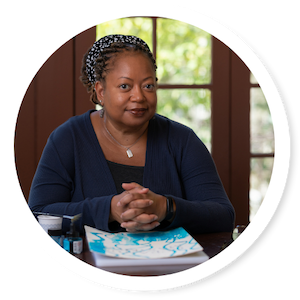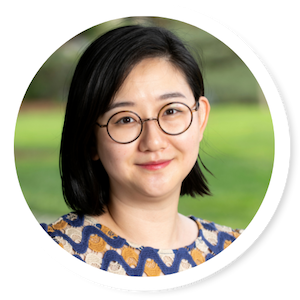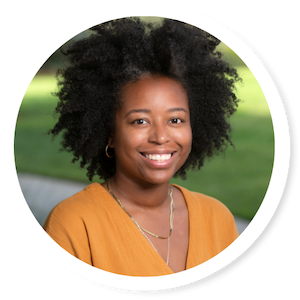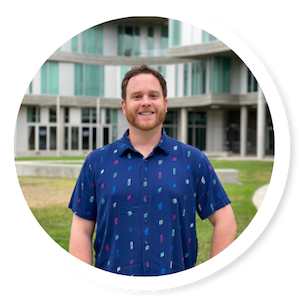Search

Chinese history & medicine
Emily Baum is an associate professor of modern Chinese history. Her research interests revolve around illness, deviance, alternative medicine, and popular beliefs and superstitions. Her next book project, tentatively titled, “Needled: How Acupuncture Became Alternative,” looks at the history of acupuncture as it circulated from China to the United States starting in the 1970s. It bridges modern Chinese history, global and transnational history, and the history of medicine to trace the process by which acupuncture was transformed from a relatively unknown medical procedure in the first half of the 20th century to one of the most popular alternative medicine techniques by the end of the century.

History & digital humanities
Sharon Block is a history professor and associate vice provost for equity, diversity and inclusion. Block is known for her groundbreaking feminist scholarship on race and sexuality in colonial North America and the digital humanities. Her work on the history of rape continues to be meaningful in the modern #MeToo era, while her digital humanities publications range from foundational work on data-mining in the humanities to critiques of racist, anti-Indigenous and sexist algorithms. Finally, she publishes on contemporary issues of bias and equity in academia.

English & physical sciences
Megan Cole is an English Ph.D. student who conducts “ecocritical” literary research. Through a humanistic framework, Cole hopes to understand how fossil fuels became ingrained in American culture throughout the 20th century and how fiction might enable us to envision more sustainable, socially just ways of living in the future. Cole was also a graduate student researcher for Solutions that Scale, a UCI initiative working to identify and implement scalable and equitable solutions to climate change. With a team of UCI faculty collaborators including chemists, public health experts and sociologists, Cole wrote a white paper about how humanists can help climate scientists imagine and implement effective, equitable solutions to the climate crisis.

Philosophy & nursing
Josh Dolin, a philosophy Ph.D. candidate, was a graduate student researcher for the UCI Center for Nursing Philosophy. He co-developed and co-instructed a pilot course for nursing professionals who are interested in the intersection of philosophy and nursing scholarship. He served as a mentor for workshop participants as they researched their interests at the intersection of ethics and nursing practice. Dolin also assisted Professor Duncan Pritchard in developing the Anteater Virtues project, a campus-wide initiative that embeds the inculcation of four intellectual virtues – curiosity, intellectual humility, tenacity and integrity – into the UCI curriculum.

Visual studies & ocean studies
Kathie Foley-Meyer is a mixed media artist and Ph.D. candidate in visual studies. After spending time in the western and eastern portions of the African continent, she became interested in the journey of human cargo who did not survive the Middle Passage. Using the online database slavevoyages.org, she studied data compiled from the 400+ years of the trade in human beings from the continent. The extrapolated data was the inspiration for “Twelve Voyages,” an abstract piece that depicted select voyages from the database, including several that originated on the eastern coast of the United States. Her art project and dissertation research led to her joining the Ocean Memory Project, which culminated in a multichannel video and virtual reality installation that explores Blackness and its relationship to the ocean. The first portion of the video series recently made its debut at the Fulcrum Festival's Deep Ocean/Deep Space symposium, "Beyond All Measure: The Sea, The Sky, the Horizon of Our Transitional Present."

Comparative literature & indigenous studies
Associate Professor of Comparative Literature John Blair Gamber focuses their research on Native American literature as well as the ways that Indigeneity and race intersect with the other-than-human, gender and sexuality, and legal structures. They are the author of Positive Pollutions and Cultural Toxins: Waste and Contamination in U.S. Ethnic Literatures (University of Nebraska Press, 2012), which was a finalist for the Association for the Study of Literature and Environment’s award for ecocriticism. They are currently working on their next book, “Deeply Unsettling: Native American Speculative Fiction,” which examines the rapidly expanding canon of Native-authored texts of science fiction, fantasy and horror.

Media & Latinx studies
Arcelia Gutiérrez, assistant professor of film and media studies, is working on a book manuscript that traces how Latinx media activists have navigated processes of deregulation and neo-liberalization and the strategies they’ve used to push for the inclusion of Latinxs in television, film and radio from the 1980s to the present. Her articles have appeared in Critical Studies in Media Communication, Television and New Media and Feminist Media Histories. Her research interests include media activism, Latinx studies, media industries, broadcasting history and digital media.

Philosophy & law
As an associate professor of philosophy and the director of the humanities and law minor, Jeffrey Helmreich works in ethics and legal philosophy, specifically moral psychology, speech acts, moral and legal remedy, and the philosophy of torts and evidence. He is also co-director of the Center for Legal Philosophy. In his work at the center, as well as in his own research, he probes powerful themes in law that philosophy can help illuminate or interrogate. For example: what is a legal right, and how is it different from a moral right, a claim, a demand or an interest?

Gender studies & classics
Aleah Hernandez is an assistant professor of teaching in the Department of Classics. Her research focuses on issues of violence and gender in classical literature. More specifically, she examines how acts of violence affect the portrayal of women not only as victims of violence but as perpetrators of such acts as well. Hernandez is currently developing several projects that highlight the intersection of classics and popular culture. She has an article forthcoming which details the parallels between Hesiod's myth of Pandora and Alex Garland's 2014 film, “Ex Machina.” More specifically, the article examines the gender dynamics in the myth and notes how these dynamics carry over in the interactions between the men and “women” in the film.

Design & Korean studies
Seungyeon Gabrielle Jung is an assistant professor of art history and visual studies. Her research examines the politics and aesthetics of design, particularly the confluence of modernism and developmentalism in the postwar Korean context. Her reading of design objects and practices challenges the widely accepted understanding of “design as problem-solving,” which envisions the developing world as a series of problems to be “solved” by Western methods. She is currently working on her first book, “Toward a Utopia Without Revolution,” in which she looks at the political and aesthetic problems that modern design created in South Korea. Jung also writes on the issue of feminism and design for the Korean audience.

Gender studies & literature
Mahaliah Little is an assistant professor of gender and sexuality studies. Her forthcoming project theorizes representations of Black women's sexuality in the aftermath of sexual violence in fiction, film and memoirs. Little's research on Black women's sexuality and representation has been featured in Black Female Sexualities (Rutgers University Press, 2015) and in American Quarterly. Her research interests include Black feminist theory and aesthetics, Black sexuality studies, trauma narratives, popular culture and the social utility of representation. She is generally interested in how contemporary Black women's fiction disrupts linear conceptualizations of recovery from trauma. Her work has also been featured in Rejoinder (an online journal published by the Insititute for Research on Women at Rutgers University).

English & political economy
Annie McClanahan, associate professor of English, researches contemporary American literature and culture, economic thought and history, Marxist theory, and theory of the novel. Her first book, Dead Pledges: Debt, Crisis, and 21st Century Culture (Stanford University Press, 2016), explores the ways that U.S. culture – from novels and poems to photojournalism and horror movies – responded to the collapse of the financialized consumer credit economy in 2008. Her new book project, “Tipwork, Gigwork, Microwork: Culture and the Wages of Service,” takes up the rise of service work by attending to contemporary cultural forms from TV to conceptual art.

African American studies & physics
An associate professor of African American studies, John Murillo’s research merges two seemingly disconnected fields: literature and physics. His inaugural book, Impossible Stories: On the Space and Time of Black Destructive Creation (Ohio State University Press, 2021), examines 20th and 21st century Black literature alongside concepts of physics, from the blueshift phenomenon to theories about structure formation in the cosmos. In Impossible Stories, Murillo aligns his work heavily with Afropessimism, a critical framework that describes the ongoing and long-term effects of racism, colonialism and slavery on lived Black experiences.

French & performing arts
French Professor Carrie Noland began her career as a scholar of 19th and 20th century French poetry. Over time, she turned increasingly toward performance genres – performance poetry first, then dance and now theater. Noland’s work on the European and American avant-garde led her to consider the relationships between European artists such as Marcel Duchamp and James Joyce and American artists such as Bill T. Jones, John Cage and Merce Cunningham. Her most recent book, Merce Cunningham: After the Arbitrary (University of Chicago Press, 2019), brings new insight to one of the most influential choreographers of the 20th century. Crossing disciplinary boundaries, Noland studies how ideas about aesthetics and politics travel from literature to music to theater to dance.

Black studies & film
Philana Payton, assistant professor of film & media studies, utilizes Black studies, performance theory and film theory to explore Blackness and visual culture through Black women’s performances. Payton has also done extensive archival research on early 20th century Black silent cinema and has conducted race and gender analyses on classical era films through today's cinema, television and media. She is currently working on her first manuscript, tentatively titled “Celestial Bodies: Black Women, Hollywood, and the Fallacy of Stardom.”

Japanese literature & environmental studies
Jon Pitt, assistant professor of East Asian studies, examines the intersections of Japanese literature and media (including cinema and sound media) and the environmental sciences. His goal is to bring the study of Japan into the growing field of critical plant studies. His current project, titled “Becoming Botanical: Rethinking the Human through Plant Life in Modern Japan,” proposes that vegetation (and the scientific study of plants) offered a number of modern Japanese writers and filmmakers a new model through which to rethink human subjectivity and develop notions of plasticity in response to turbulent historical events.

Asian American & Chicanx/Latinx studies
Isabela Seong Leong Quintana is an assistant professor in the Department of Asian American Studies. She is the author of the forthcoming book, “Urban Borderlands: Neighborhood and Nation in Chinese and Mexican Los Angeles, 1870s-1930s.” Using space, gender and work as categories of analysis, her study interrogates the late 19th and early 20th century racial geography of Los Angeles. Her manuscript demonstrates that, although this period is often seen through the eyes of reformers and public officials, residents – Chinese and Mexican men, women and children – shaped cultural geography daily through the configuration of public places, homes, schools, and businesses.

English & virtual reality
Dalton Salvo is a Ph.D. candidate in English who’s researching the effectiveness of virtual environments. He believes that virtual worlds are “the next evolutionary step” not only for online education but for classrooms in general. Salvo has spent his graduate career studying how digital technologies such as virtual reality immerse their users and keep them engaged through creativity and exploration. When the pandemic hit in early 2020 and students and employees around the world had no choice but to work purely online, virtual worlds took on a new meaning. Salvo is working with Biomedical Engineering Professor Christine King to construct his own virtual world platform, designing it to accommodate any number of students across a wide range of disciplines.

Religious & Japanese studies
Elizabeth Tinsley is an assistant professor in the UCI Department of East Asian Studies. She researches Buddhist history and culture in Japan and is currently writing about mountain gods, spirit possession and Buddhist institution formation. She is trained in European and Japanese art history, has been educated in the U.K., Japan and the U.S., and is an ordained nun in the esoteric Buddhist school of Shingon. Through her work, she moves between cultures and cultivates connections for the broader benefits of knowledge sharing.

Spanish & education
Julio Torres is an associate professor of Spanish and Portuguese and director of the Spanish Language Program. Torres has been instrumental in revamping UCI’s Spanish language series, implementing a task-based model for language teaching that is used by all teaching assistants in the Spanish program. He is the co-developer and director of the minor in Spanish/English bilingual education, which provides undergraduates with foundational knowledge of current issues in bilingual education and linguistic and cultural phenomena, along with opportunities for hands-on experience in a K-12 bilingual classroom.

Japanese art & environmental studies
In Bert Winther-Tamaki’s new book, Tsuchi: Earthy Materials in Contemporary Japanese Art (University of Minnesota Press, 2022), the art history and visual studies professor explores the omnipresence of tsuchi – Japanese for “soil” – in contemporary Japanese art, especially in ceramics, photography and sculpture. Winther-Tamaki studied how, in response to the devastating environmental degradation and soil pollution Japan has weathered since the 1950s, the nation’s artists turned tsuchi into art to illuminate its redemptive, culturally significant and ecologically crucial nature – and to inspire us to save it before it’s too late.

